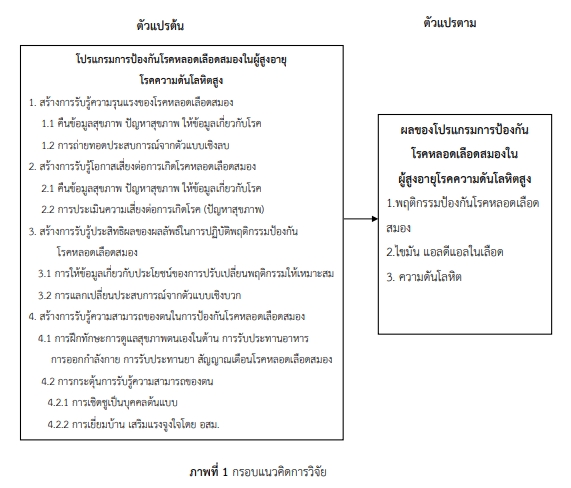ผลของโปรแกรมการป้องกันโรคหลอดเลือดสมองในผู้สูงอายุโรคความดันโลหิตสูง
คำสำคัญ:
ผู้สูงอยุ, การป้องกันโรค, โรคความดันโลหิตบทคัดย่อ
การวิจัยกึ่งทดลองแบบหนึ่งกลุ่มวัดผลก่อนและหลังทดลอง มีวัตถุประสงค์เพื่อศึกษาผลของ โปรแกรมการป้องกันโรคหลอดเลือดสมองในผู้สูงอายุต่อความดันโลหิตและไขมันในเลือด กลุ่มตัวอย่างเป็นผู้สูงอายุที่ได้รับ การวินิจฉัยว่าเป็นโรคความดันโลหิตสูงในโรงพยาบาลส่งเสริมสุขภาพตำบลแห่งหนึ่ง จำนวน 34 คน เลือกกลุ่ม ตัวอย่างตามคุณสมบัติที่กำหนดใช้การสุ่มอย่างง่าย ระยะดำเนินการทดลอง 12 สัปดาห์ เก็บข้อมูลทั่วไป พฤติกรรมการป้องกันโรคหลอดเลือดสมอง รายด้านดังนี้ ด้านการรับประทานอาหาร ด้านการออกกำลังกาย ด้านการรับประทานยาผ่านการตรวจสอบความตรงและความเที่ยงได้ค่าสัมประสิทธิ์แอลฟาของครอนบราคเท่ากับ 0.92 รายด้าน 0.88, 0.73, และ 0.73 ตามลำดับ วิเคราะห์ข้อมูลโดยใช้สถิติพรรณนา และสถิติทดสอบที
ผลการศึกษาพบว่าหลังใช้โปรแกรมฯกลุ่มตัวอย่างมีค่าเฉลี่ยคะแนนรวมพฤติกรรมการป้องกันโรคหลอดเลือดสมองสูงกว่าก่อนการใช้โปรแกรมฯอย่างมีนัยสำคัญทางสถิติที่ระดับ .05 และพบว่ากลุ่มตัวอย่างมีค่าเฉลี่ยความดันโลหิตซิสโตลิกและความดันโลหิตไดแอสโตลิก ระดับไขมันในเลือดแอลดีแอลลดลง อย่างมีนัยสำคัญทางสถิติที่ระดับ .05 ดังนั้นจึงควรนำโปรแกรมฯมาใช้เป็นแนวทางในการปรับเปลี่ยนพฤติกรรมการป้องกันโรคหลอดเลือดสมองมาประยุกต์ใช้กับกลุ่มประชากรโรคเรื้อรังที่มีลักษณะใกล้เคียงกัน

ดาวน์โหลด
เผยแพร่แล้ว
รูปแบบการอ้างอิง
ฉบับ
ประเภทบทความ
สัญญาอนุญาต
ลิขสิทธิ์ (c) 2024 วารสารการส่งเสริมสุขภาพและอนามัยสิ่งแวดล้อมบทความในวารสารนี้มีลิขสิทธิ์โดยและเผยแพร่ภายใต้สัญญาอนุญาต Creative Commons แบบแสดงที่มา-ไม่ใช้เพื่อการค้า-ไม่ดัดแปลง 4.0 ระหว่างประเทศ (CC BY-NC-ND 4.0)
สามารถอ่านและนำไปใช้เพื่อวัตถุประสงค์ทางวิชาการ เช่น การสอน การวิจัย หรือการอ้างอิง โดยให้เครดิตแก่ผู้เขียนและวารสารอย่างเหมาะสม
ห้ามใช้หรือดัดแปลงบทความโดยไม่ได้รับอนุญาต
ข้อความที่ปรากฏในบทความเป็นความคิดเห็นของผู้เขียนแต่เพียงผู้เดียว
ผู้เขียนต้องรับผิดชอบต่อเนื้อหาและความถูกต้องของบทความของตนทั้งหมด
การนำไปใช้ซ้ำหรือเผยแพร่ซ้ำในรูปแบบอื่นต้องได้รับอนุญาตจากวารสาร





